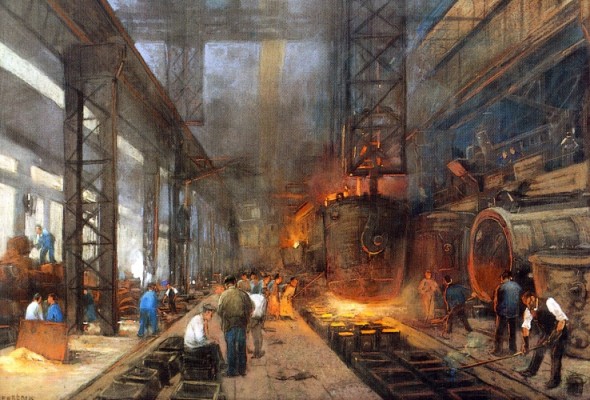Social justice is to real justice as social science is to real science
The thing that strikes me about campaigns for “social justice” is their incredible acceptance of laziness. “Looking at all these people, some of them have more than others, and man is prone to steal and cheat…soooo we’ll just lump everybody who has something into the ‘cheater’ category, and everybody who doesn’t have it into the ‘victim’ category. That’ll save a lot of time, compared to investigating who actually stole from whom.”
Social justice is a special kind of fallacy, because it seeks to utilize the weapons of justice (traditionally, in the West, prisons, guillotines, rifles, gas chambers, electric chairs, whips, and pillories) to address social concerns. We should immediately be alarmed by this combination; it is like hearing a man lament the neglect and decay of some local landmark, and then, instead of asking for donations of funds to rescue it, request the authority to behead people. The weapons of justice are naturally terrible and mighty powers; the keys to life and death, liberty and confinement, are entrusted to the test of justice. How confused a thing it is to seek to use this arsenal of terror, not to destroy some rising villain or tyrant, but to redirect the normal working man, the normal investor, the normal retiree, the normal saver, in short, all the normal men of the world who would not think of snatching the property of another, nor shortening his life, injuring his person, or speaking a harsh word to him. Social justice is the effort to use the weapons we kept sharp and ready to answer a murderous fiend, to coerce and manipulate the man who keeps too much or too little in his savings account, according to the opinion of Keynes or his heirs.
There’s a historical point I want to make (indeed, it’s the issue that inspired this whole article) about the Left, and the campaign for social justice, that I cannot help but fear will be entirely misinterpreted. Yet if there’s a safe place to state it, it’s here. When I read someone like Hillaire Belloc or GK Chesterton, either of whom would be embraced as a campaigner for social justice by their modern heirs, there’s something I see in them that I don’t see on the Left today. Chesterton would say something viciously critical of the standard of living in London of his day, lament low wages, high rents as proportional to incomes, monopsonies and cartels of demand for labor and monopolies of supply of housing and necessities…indeed he’d get this far and echo deeply in the leftist’s mind, in his day or today. And then he’d do something nobody else bothers to do in either era: He’d seek to attribute the problem to a miscarriage of real justice. It wasn’t enough for him to point angrily at a graph showing incomes, he had to find a moral fault before he would issue a moral indictment. In his particular case, the enclosure acts and mendicancy laws were of primary importance even though he was, in principle, in favor of state intervention. He saw no reason for the state to refuse to intervene for the benefit of the citizens (according to his autobiography), yet he could not be induced to redistribute wealth from man A to man B, unless it could be shown that man B had stolen it from man A.
Part of this was no doubt his serious commitment to property; anarchists, think of the minarchist in your life and imagine what they would tell you about the state defending property rights. This is how these men who never saw the New Deal hoped that the state could function. It was more possible in a bygone age to maintain a serious commitment to property and a simultaneous commitment to the state than it is today; you merely had to rationalize taxation in that age, and many people still do it. But it was more credible then than it is now.
Hillaire Belloc’s work, which has been delightful as far as I have explored it, shares the same character. He reserves the right for the state to do all kinds of forcible things, but ends up, in practical terms, blaming the entirety of the misfortune of industrial workers during the Industrial Revolution (around which so much Left/Right controversy centers) on the actions of the King of England. Belloc, like Chesterton, attempts to establish in principle the general power of the state to do the things it does, but in practice makes a case for it to stop it.
There’s a reality we have to confront in dealing with social justice types: They are unshakably convinced that the factory of the early industrial age was an absolute hell and blight on humanity. They generally haven’t examined primary source documents, they generally can’t conceive of pre-industrial poverty in a meaningful way, but they know that factory must be undone, the way you or I know eminent domain must be undone. As a matter of strategy, the rhetorical victory of Dickens is a fact we cannot ignore. To try to defend factory working conditions as superior to the near-starvation of pre-industrial farming is to display yourself as a shill and open the door for all kinds of rhetorical attack…meanwhile, I watch Left Libertarians answer this attack the way Judo master answers a punch: “Indeed, London in the 1800’s was a miserable place to be employed. People were chased into those horrible factories by the threat of eviction or starvation; desperation and lack of options, as you say, made them subject to all kinds of exploitations. Where did they come from? The English countryside? What drove them out? Parliament was enacting at that very time confiscatory legislation that dispossessed innumerable farmers, if not from their homes, at least from key elements of their livelihood. These men only became desperate enough to seek out the employment we abhor as a result of having their interest in a productive process seized by the government and given to others. It was robbery that impoverished them.” With this approach, one does not have to move the unshakeable rock of Leftist belief in intolerable working conditions. One is instead pointing to a deliberate, explicit government policy of impoverishment, and saying “So…you’re just going to write that off as a coincidence? There’s government agents out kicking people off their farms and wrecking their livelihoods, and that has nothing to do with the lines of men begging for sweatshop employment? Just two unrelated things, are they?”
Rhetorical value aside, this approach complies with the unspoken rule I brought up earlier, which modern social justice campaigns ignore: Moral indignation must be aimed at moral faults. If you want to be outraged about conditions, especially if you want to turn that outrage into a reason to use force, it’s not enough that the graphs and charts don’t look the way you want them to: You need find and attack a real injustice, a real, specific, abuse of rights, if you want to use the weapons of justice. I feel that it was this exact principle that kept someone like Belloc from flying off into the kind of policies Marx or Pikkety would inflict on us, even when he would argue in principle the state’s right to employ them. It’s one of the great misfortunes of living in the age of social justice that this principle is all but forgotten, and the humanitarian with the guillotine is now a familiar figure.
Sam Peters: Is a small business opperative and libertarian blogger. His original post is reproduced here by kind permission and is available here..
https://whiteboard.liberty.me/social-justice-is-to-real-justice-as-social-science-is-to-real-science/







